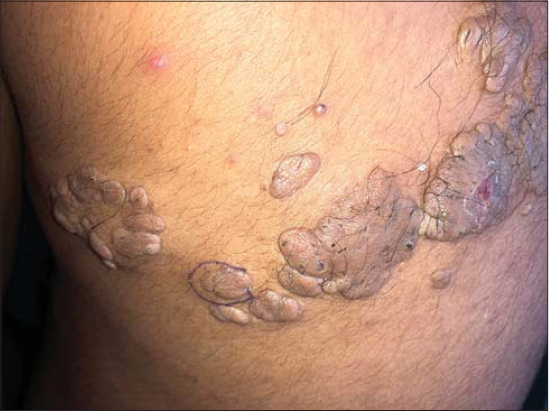Nevus lipomatosis superficialis of Hoffmann and Zurhelle
Mariet Zacharias , Boothankad Chandregowda Sharathkumar
, Boothankad Chandregowda Sharathkumar
Department of Dermatology, Venereology and Leprosy, Kempegowda Institute of Medical Sciences Hospital and Research Centre, K R Road, Makalakuta Circle, V V Puram, Bangalore, Karnataka, India
Corresponding author: Mariet Zacharias, MD
How to cite this article: Zacharias M, Sharathkumar BC. Nevus lipomatosis superficialis of Hoffmann and Zurhelle. Our Dermatol Online. 2021;12(e):e21.
Submission: 06.12.2020; Acceptance: 27.03.2021
DOI: 10.7241/ourd.2021e.21
Citation tools:
Copyright information
© Our Dermatology Online 2021. No commercial re-use. See rights and permissions. Published by Our Dermatology Online.
Sir,
Nevus lipomatosis superficialis was first described by Hoffmann and Zurhelle in 1921 [1]. This nevus has been described to be a rare benign hamartoma [2].
Our patient a 20-year-old male who came to us with a multiple raised lesion over the left flank. The lesions were asymptomatic. The lesions were of varying sizes ranging from 1 x 1 cm to 6 x 4 cm. Some of the individual lesions have coalesced to form a single larger lesion. The overlying skin has an irregular surface with some areas showing small openings. He reports that on squeezing these lesions, white cheesy material extrudes out from these openings. The patient has had these lesions since birth however they have been progressively increasing in size in proportion to his growth. No similar history in the family. On examination we observed multiple skin colored to hyperpigmented papules, plaques and nodules present unilaterally on the left flank distributed linearly. The skin over few lesions also had yellowish appearance. The lesions were well defined with varying sizes and shapes (1 x 1cm to 6 x 4 cm) with an irregular surface and margin. (Fig. 1) Few of the papules and plaques have coalesced to form a larger lesion. Some areas show a cerebriform surface and comedo like openings. Most of the lesions were sessile with few being pedunculated. The lesions were non tender. White cheesy material could be expressed out from the comedo like opening on applying pressure. Dermoscopic evaluation was done using a DermLite DL4. Dermoscopy showed areas of cerebrifom pattern with sulci and gyri, yellow structureless areas, comedo like opening and pigment network (Figs. 2 and 3). A 3.5 mm punch biopsy was taken from the lesion and sent for histopathological examination. The biopsy report showed, varying proportion of mature adipose tissue around sub papillary vessels. Dermal collagen appears thickened and vascularity appear greater than normal. Boundary between dermis and hypodermis was ill defined (Fig. 4). Hence a diagnosis of Nevus lipomatosis superficialis of Hoffman and Zurhelle was made.
The patient was assured the benign nature of the lesion and was explained the option of surgical removal. He however was not willing for any surgical procedures at the time.
The word nevus is derived from Latin meaning “maternal impression”. It is used synonymously with hamartoma which is derived from Greek word hamartia meaning “error”. The nevus lipomatosis superficialis is a fat nevus. It has two known forms the classical type and the solitary type. The classical type was described by Hoffman and Zurhelle [1], and hence it has been named after them. The lesions are multiple, soft, nontender, pedunculated, cerebriform, yellowish or skin-colored papules or nodules [3]. The lesions may coalesce. The most common site is the pelvic girdle area, i.e., the involvement of one hip or buttock [3–5]. The trunk and abdomen are rare sites of manifestation5 as was in our patient. The onset of the lesion is usually at birth or at infancy. The solitary lesions have a later onset with a predilection to the trunk [5]. The nevi maybe associated with comedo-like lesions and hypertrichosis over the nevus, angiokeratoma of fordyce, cafe-au-lait or vitiligo-like macules, hemangioma, and basal cell carcinoma [6]. Our patient had comedo-like lesions. It is considered to be a nevoid anomaly with the ectopic fat cells derived from the perivascular mesenchymal tissue. Histopathologically it has groups and strands of mature fat cells which are found embedded among the collagen bundles of the dermis, often as high as the papillary dermis. When there is large amount of the mature fat cells distributed throughout the dermis the hypodermis and dermis cannot be delineated [5].
Dermoscopy of nevus lipomatosis superficialias is not known to have any distinctive features. Most commonly seen findings are the yellow structureless areas due to the fat deposition and the cerebriform surface due to its irregular surface and comedo like openings. These findings may be present in other conditions like seborrheic keratosis [7].
Differential diagnosis to be considered include, nevus sebaceous, nevus commedonicus, focal dermal hypoplasia, connective tissue nevus, neurofibroma, and acrochordons.
The condition is benign hence surgical removal is for cosmetic purposes.
CONCLUSION
The above case has been reported due to the unusual characteristics observed in this benign hamartoma. Our patient had a presentation in the trunk. The lesion also showed comedo like openings on its surface. Diagnosing this condition is important as it is completely benign and the patient can be assured of the same.
Consent
The examination of the patient was conducted according to the principles of the Declaration of Helsinki.
The authors certify that they have obtained all appropriate patient consent forms, in which the patients gave their consent for images and other clinical information to be included in the journal. The patients understand that their names and initials will not be published and due effort will be made to conceal their identity, but that anonymity cannot be guaranteed.
REFERENCES
1. Hoffmann E, Zurhelle E. Uber einen naevus lipomatodes cutaneous superficialis der linken glutaalgegend. Arch Dermatol Syphilol. 1921;130:327-33.
2. Bhushan P, Thatte SS, Singh A. Nevus lipomatosus cutaneous superficialis:A report of two cases. Indian J Dermatol. 2016;61:123.
3. Pujani M, Choudhury M, Garg T, Madan NK. Nevus lipomatosus superficialis:A rare cutaneous hamartoma. Indian Dermatol Online J. 2014;5:109-10.
4. Abdullah M, Lateef A. Nevus lipomatosus superficialis. Our Dermatol Online. 2020;11:412.
5. Ragsdale BD. Tumors with fatty, muscular, osseous, and/or cartilaginous differentiation. Lever’s histopathology of the skin, 10th ed. Elder DE, Elenitsas R, Jhonson BL, Murphy GF, Xu X editors. Wolters Kluwer-Lippincott Williams &Wilkins;2009.
6. Turan E, Yesilova Y, Ucmak D, TürkcüG, Celik OI, Gürel MS. Nevus lipomatosus cutaneus superficialis associated with nevus sebaceous of Jadassohn. Indian J Dermatol Venereol Leprol. 2014;80:194.
7. Vinay K, Sawatkar GU, Saikia UN, Kumaran MS. Dermatoscopic evaluation of three cases of nevus lipomatosus cutaneous superficialis. Indian J Dermatol Venereol Leprol. 2017;83:383-6.
Notes
Source of Support: Nil,
Conflict of Interest: None declared.
Request permissions
If you wish to reuse any or all of this article please use the e-mail (brzezoo77@yahoo.com) to contact with publisher.
| Related Articles | Search Authors in |
|
|







Comments are closed.